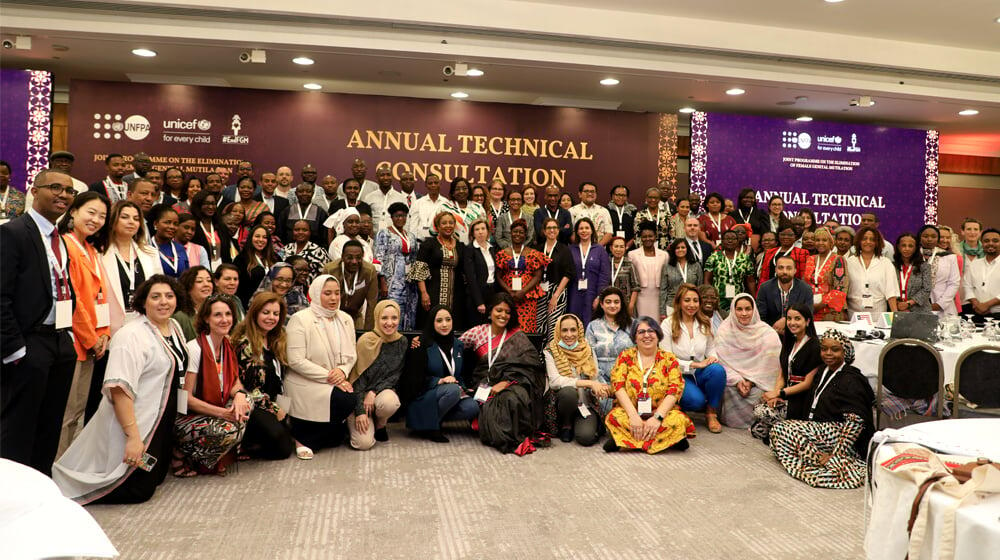Amman, 13 June 2023 – Jordan is hosting this week the 2023 Annual Technical Consultation of the global joint programme of UNFPA-UNICEF on the Elimination of Female Genital Mutilation (FGM). This consultation brings together more than 100 participants, key stakeholders and experts from more than 22 countries- including countries not supported by the Joint Programme, such as Indonesia, Liberia, Niger, Sierra Leone, and Tanzania- to exchange lessons, achievements, and challenges in the implementation of the programme.
The Joint Programme, now in its 2nd year of the fourth phase of implementation (2022-2030), strives to create a world free from FGM, where every girl and woman has a voice, choice, and agency. By partnering with governments, civil society, development partners, and communities, the Joint Programme supports the development of policies, access to services, empowerment of girls and women, and social and gender norms change.
“We need to consider how we work amidst the rising tide of conflict and instability that is enabling millions of more cases of FGM to take place” stated HRH Princess Basma, who is the Goodwill Ambassador of UNFPA, in a recorded message at the opening of the consultation meeting, “We must address the worrying trend of health personnel performing FGM, giving this ghastly practice a sheen of respectability. And we must continue to work to promote women and girls agency and leadership, empowering them to affect change and end this terrible practice,” She added.
The three-day Annual Technical Consultation provides a platform for staff from UNFPA and UNICEF to share experiences, progress, and strategies for adaptation. In-depth discussions and reflections focus on intervention areas, including the humanitarian-development nexus, cross-border issues, medicalization, gender-transformative acceleration, climate change, and social and behavior change.
Since 2012, Jordan - which has the second highest share of refugees per capita in the world - has received migrants and asylum seekers from countries with high FGM prevalence rates, such as Sudan, Somalia. and Yemen.
UNFPA’s recent research investigating on the magnitude of the FGM phenomenon among non-Syrian refugees shows generally declining rates of the practice since the arrival in Jordan, and yet showed evidence of FGM still occurring, with unaddressed needs for the women and girls survivors, in particular when seeking counselling and healthcare services. (Female Genital Mutilation among non-Syrian Refugees/migrants in Jordan report)
“One is too many, forcing even one girl or grown woman to be subjected to any form of harmful practices is outrageous, let alone millions of girls around the world.” Said Laila Baker, UNFPA Arab State Regional Director. “To me FGM is about a girl being denied forever the right to protect her own body and dignity, the right to feel or sense normal human feelings of intimacy in the future and most importantly to feel like a “whole complete woman.” Baker added.
The Amman meeting provides an advocacy opportunity for the host region. Senior government officials are joining the opening ceremony, and representatives from the selected country/region are sharing their experiences in addressing FGM.
UNFPA remains committed to achieving zero gender-based violence and harmful practices including eliminating FGM globally and protecting the rights and well-being of every girl and woman.
####
About UNFPA
UNFPA is the United Nations sexual and reproductive health agency. UNFPA's mission is to deliver a world where every pregnancy is wanted, every childbirth is safe and every young person's potential is fulfilled. UNFPA calls for the realisation of reproductive rights for all and supports access to a wide range of sexual and reproductive health services.
About the UNFPA-UNICEF Joint Programme on the Elimination of FGM
UNFPA and UNICEF lead the Joint Programme on the Accelerated Abandonment of FGM, the largest global programme to end this harmful practice, currently focusing on 17 countries, and also supports regional and global initiatives.


